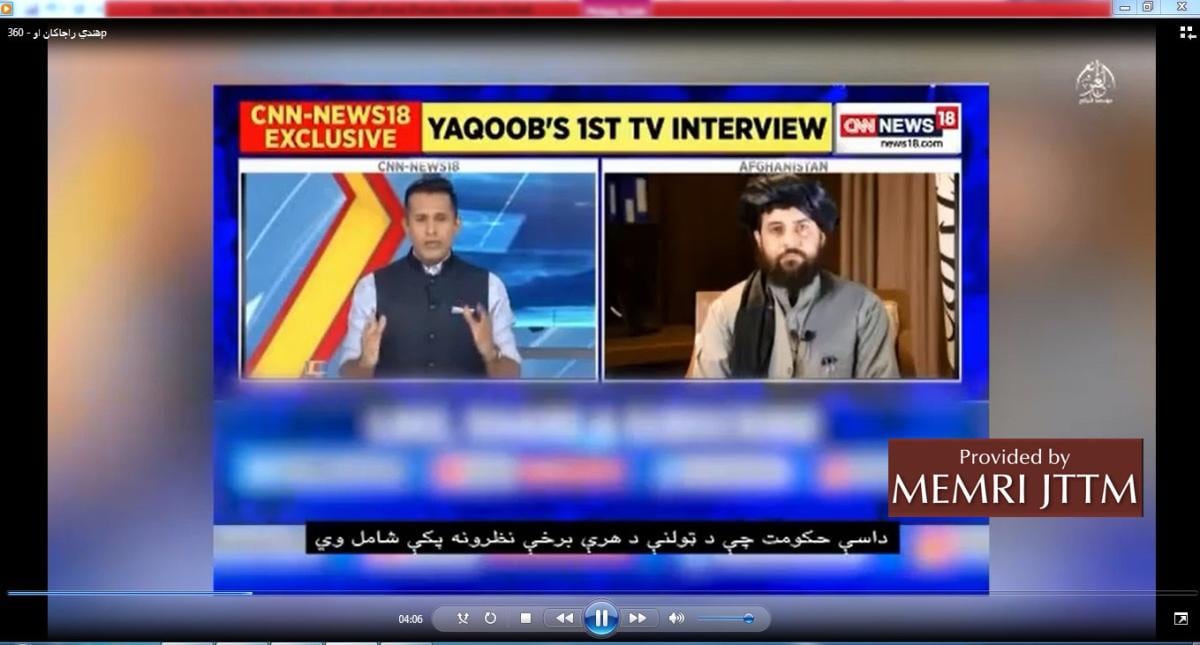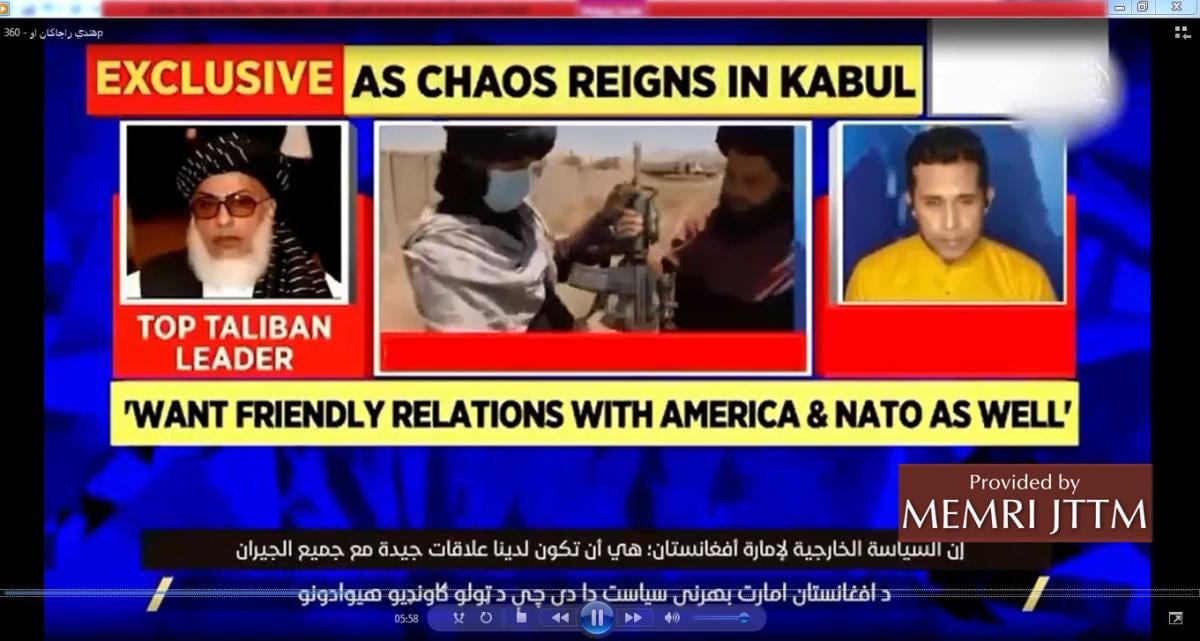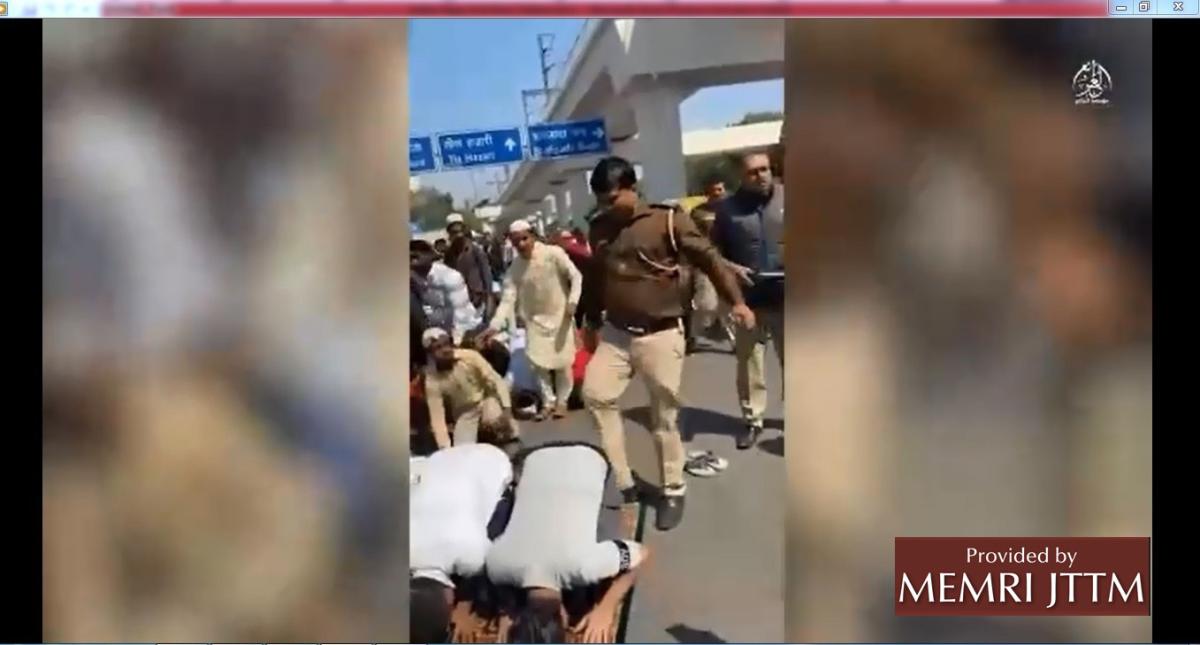The following report is now a complimentary offering from MEMRI's Jihad and Terrorism Threat Monitor (JTTM). For JTTM subscription information, click here.
In a Pashtu-language video, the Islamic State Khurasan Province (ISKP) criticized the Islamic Emirate of Afghanistan (IEA, i.e., the Afghan Taliban) for developing diplomatic relations with India while ignoring crimes against Muslims in India.
The 21-minute Pashtu-language video is titled "Indian Kings And The Slave Taliban." It was published by Al-Azaim Media Foundation, a media outlet linked to ISKP, and was shared on Telegram. The video includes a commentary on Afghan Taliban's relations with the Indian government and Hindus. The commentary is voiced by ISKP media figure Sultan Aziz Azzam.

A copy of the Indian invitation to the Taliban ambassador in UAE.
The ISKP publishes books, videos, and pamphlets in Dari and Pashtu languages; comments on regional events and world affairs in their publications, but their main focus is on anti-Taliban propaganda.
Sultan Aziz Azzam begins the video by attacking the Taliban. He asserts that the Taliban have good relations with India despite the fact that Hindus are not Muslim, they hate Muslims, and they destroy mosques. The video points out that Nupur Sharma, a spokeswoman of the ruling Bharatiya Janata Party of Prime Minister Narendra Modi, had openly insulted Prophet Muhammad. Narendra Modi and other members of his party also insulted the prophet, the video claimed.
Sultan Aziz Azzam points out that the Afghan Taliban did not react to India's anti-Islam policies – while, at the same time, the Taliban Defense Minister Mullah Yaqoob gave an interview to an Indian television saying they would maintain relations with India to destroy ISIS. A section of Mullah Yaqoob's interview was included in which he stated that the Taliban had no problem with India, and that the Taliban had defeated ISIS in Afghanistan.

The video includes a clip of Taliban Defense Minister Mullah Yaqoob.
Additionally, an interview with the Taliban's Deputy Minister of Foreign Affairs Sher Mohammad Abbas Stanikzai, which he gave to a different Indian television station, is included as further evidence. Stanikzai is quoted as saying that the IEA policy is to have good relations with all countries, and they will strengthen relations with India.
The commentator says that India knows there is no danger from the Taliban, and that is why it sent a delegation to Kabul to increase bilateral cooperation against Muslims, which the Taliban welcomed. According to the video, polytheist Hindus know that even if they destroy mosques and insult Islam, all these have no importance to the Taliban, and the important thing for the Taliban is to remain in power.
The video features a clip of Akif Mohajer, the spokesperson of the Ministry of Vice and Virtue. Mohajer declares that Hindus and Sikhs are safe in Afghanistan; they enjoy religious freedom, and IEA has no problem with them.

Taliban's Deputy Foreign Minister Sher Mohammad Abbas Stanikzai is quoted as saying the Taliban government wants friendly relations with all countries.
According to the video, this recklessness by the Taliban has encouraged Hindus, because they demolished the Babri Masjid – the Mosque of Babur in Ayodhya, India – and built a Hindu temple there. Hindus claim the mosque was built on the birthplace of Rama, a major Hindu deity. When the Indian Chargé d'Affaires in Kabul attended a meeting of the Taliban's Ministry of Foreign Affairs, at which representatives of other countries were also present, the purpose of the meeting was only coordinatng cooperation against the Islamic State.
The video also points out that Mawlawi Badruddin, the Taliban ambassador to the United Arab Emirates, participated in India's Republic Day ceremony with his wife.
The ISKP commentator states that Muslims in India are mistreated at the governmental level, but the Taliban do not pay attention to it. The commentator continues by saying that Taliban officials have accommodated Indian diplomats in Afghanistan. He also highlights the destruction of the historical Babri Masjid by extremist Hindus. Some clips included in the video show Indian police beating Muslims while the Muslims pray, and do not allow them to pray at the site.
One of the justifications in the video for strengthening the relationship between the Taliban and India is the benefit to Afghanistan: The Hindus destroyed a mosque, but also built the Chabahar port in Iran, which benefits the Taliban. In return, in Afghanistan, the Taliban build temples for Hindus.

Clips show Indian police kicking Muslims for praying in public places.
In the video, it is also alleged that Taliban share intelligence with India and have forgotten all the atrocities perpetrated by India against Muslims. At the end of the video, Hindus are threatened. The narrator says: "We are alive. We will come and take revenge." A short video of an ISKP member is included, who speaks in Hindi, saying: 'We will come to India and slaughter Hindus.'" He adds: "If the Taliban protect you as long as possible, we will come and take our revenge."
The video closes with short scenes of ISKP attacks against the Taliban, including one on a temple in Afghanistan.
Source: Telegram/Al-Azaim Media, March 27, 2024.




